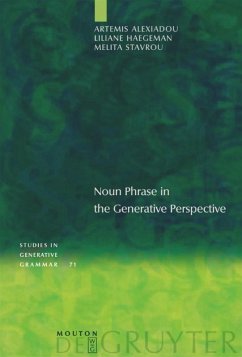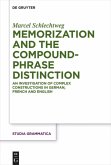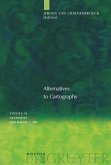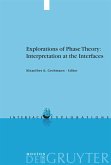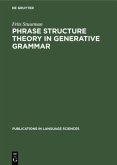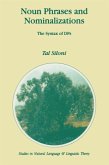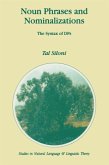Surveying noun phrases and their syntax, the book offers a theoretically oriented, comparative study in which they examine basic aspects of noun projection. The discussion includes the following topics: The DP hypothesis, the status of D in languages without determiners, demonstratives, the role of classifiers, the morphosyntactic features/projections of nouns, head and phrasal movement in the noun phrase, adjectival modification, possessors, argument structure of nouns, the partitive construction and the N-of-an-N construction.
The goal of this book is twofold. On the one hand we want to offer a discussion of some of the more important properties of the nominal projection, on the other hand we want to provide the reader with tools for syntactic analysis which apply to the structure of DP but which are also relevant for other domains of syntax.
In order to achieve this dual goal we will discuss phenomena which are related to the nominal projection in relation to other syntactic phenomena (e.g. pro drop will be related to N-ellipsis, the classification of pronouns will be applied to the syntax of possessive pronouns, N-movement will be compared to V-movement, the syntax of the genitive construction will be related to that of predicate inversion etc.). In the various chapters we will show how recent theoretical proposals (distributed morphology, anti-symmetry, checking theory) can cast light on aspects of the syntax of the NP. When necessary, we will provide a brief introduction of these theoretical proposals. We will also indicate problems with these analyses, whether they be inherent to the theories as such (e.g. what is the trigger for movement in antisymmetric approaches) or to the particular instantiations.
The book cannot and will not provide the definitive analysis of the syntax of noun phrases. We consider that this would not be possible, given the current flux in generative syntax, with many new theoretical proposals being developed and explored, but the book aims at giving the reader the tools with which to conduct research and to evaluate proposals in the literature.
In the discussion of various issues, we will apply the framework that is most adequate to deal with problems at hand. We will therefore not necessarily use the same approach throughout the discussion.
Though proposals in the literature will be referred to when relevant, we cannot attempt to provide a critical survey of the literature. We feel that such a survey would be guided too strongly by theoretical choices, which would not be compatible with the pedagogical purposes this book has.
The book is comparative in its approach, and data from different languages will be examined, including English, German, Dutch (West-Flemish), Greek, Romance, Semitic, Slavic, Albanian, Hungarian, Gungbe.
The goal of this book is twofold. On the one hand we want to offer a discussion of some of the more important properties of the nominal projection, on the other hand we want to provide the reader with tools for syntactic analysis which apply to the structure of DP but which are also relevant for other domains of syntax.
In order to achieve this dual goal we will discuss phenomena which are related to the nominal projection in relation to other syntactic phenomena (e.g. pro drop will be related to N-ellipsis, the classification of pronouns will be applied to the syntax of possessive pronouns, N-movement will be compared to V-movement, the syntax of the genitive construction will be related to that of predicate inversion etc.). In the various chapters we will show how recent theoretical proposals (distributed morphology, anti-symmetry, checking theory) can cast light on aspects of the syntax of the NP. When necessary, we will provide a brief introduction of these theoretical proposals. We will also indicate problems with these analyses, whether they be inherent to the theories as such (e.g. what is the trigger for movement in antisymmetric approaches) or to the particular instantiations.
The book cannot and will not provide the definitive analysis of the syntax of noun phrases. We consider that this would not be possible, given the current flux in generative syntax, with many new theoretical proposals being developed and explored, but the book aims at giving the reader the tools with which to conduct research and to evaluate proposals in the literature.
In the discussion of various issues, we will apply the framework that is most adequate to deal with problems at hand. We will therefore not necessarily use the same approach throughout the discussion.
Though proposals in the literature will be referred to when relevant, we cannot attempt to provide a critical survey of the literature. We feel that such a survey would be guided too strongly by theoretical choices, which would not be compatible with the pedagogical purposes this book has.
The book is comparative in its approach, and data from different languages will be examined, including English, German, Dutch (West-Flemish), Greek, Romance, Semitic, Slavic, Albanian, Hungarian, Gungbe.
"Alles in allem handelt es sich aber um ein eindrucksvolles Buch, das wohl bald den Status eines Referenzwerkes für zukünftige Behandlungen des Themas erlangen wird. Wenn man es von Anfang bis Ende durcharbeitet, wird man mit einer Fülle spannender Einsichten belohnt, die von hoher Relevanz für die linguistische Theoriebildung sind. Es ist ein anspruchsvolles und durchaus schwierieges Buch, das jeder Generativist, gleich ob syntaktisch oder semantisch interessiert, letztlich mit Gewinn lesen wird, und das als State-of-the-Art-Bericht daher in keinem universitären Bücherschrank fehlen sollte."Holden Härtl in: Zeitschrift für Rezensionen zur germanistischen Sprachwissenschaft 1/2009 "[...] Noun phrase in the generative perspective is an extremely useful book and a very welcome attempt to collect, compare and integrate in a single work a number of analyses dispersed across the literature over the last forty years. Among its merits and its coverage, the clarity of its writing and theway in which the authors have managed the difficult task of creating connections between the various sections - no small feat by far for such a diverse and complex domain."Roberto Zamparelli in: Journal of Linguistics, 2008 "Hier ist etwas sehr Inhaltreiches und Erschöpfendes gelungen."Werner Abraham in: Germanistik 3-4/2007

